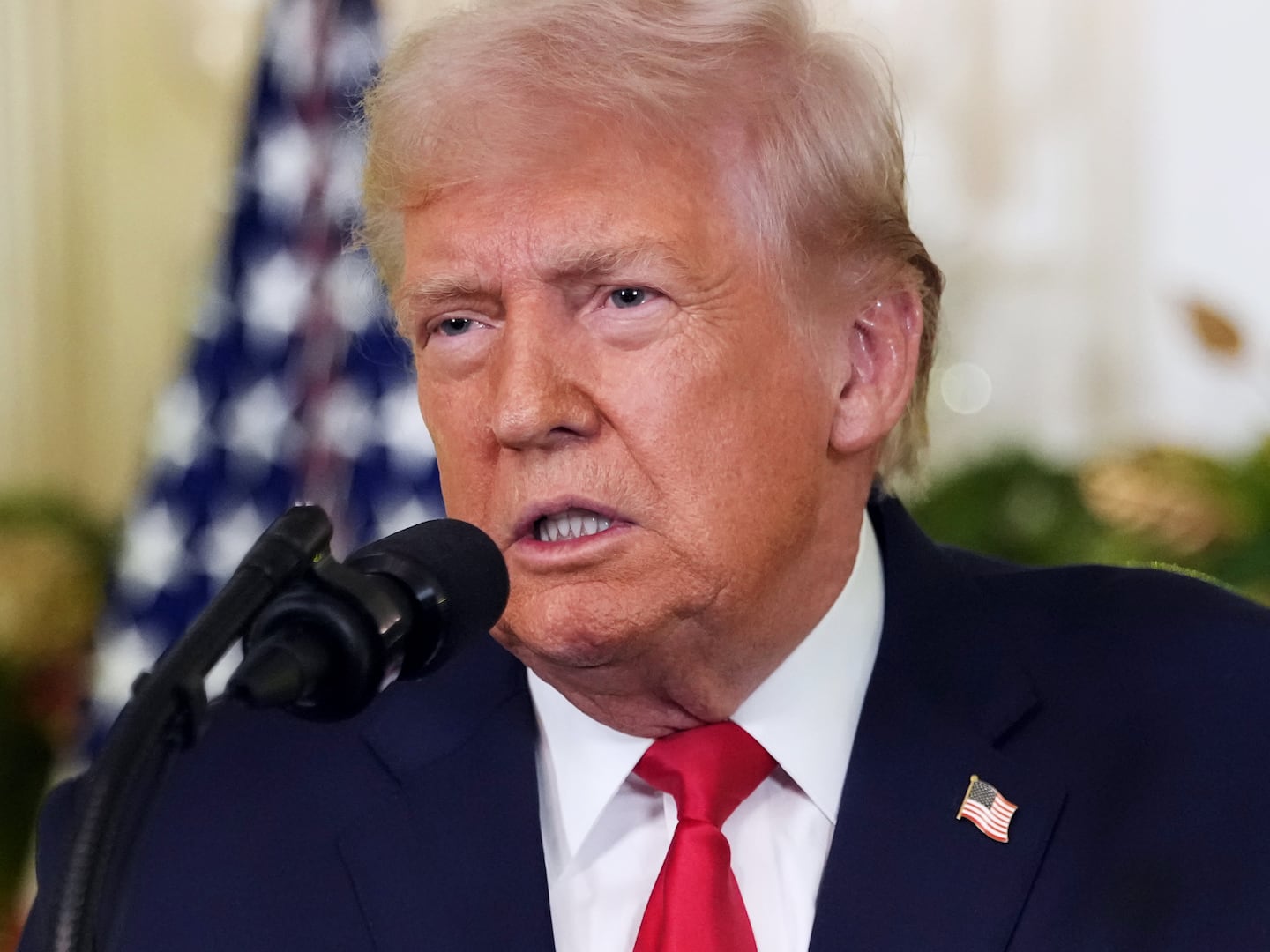The show must go on. After delivering a blistering anti-American speech at the United Nations on Thursday afternoon, Iranian President Mahmoud Ahmadinejad headed to the Warwick Hotel in midtown Manhattan for a roundtable meeting with a small group of journalists. He was in fine form, ducking and jabbing on a number of tough questions and even getting laughs on some of his wry responses. Seated beside the Iranian president was Mojtaba Samareh Hashemi, a close adviser sometimes referred to as his Karl Rove.
Ahmadinejad was, of course, questioned about Iran’s nuclear program and he gave a surprising answer, offering to stop the production of 20 percent enriched uranium if outside fuel would be supplied for a medical reactor. “Anytime they can guarantee us this sale…we will stop 20 percent enrichment,” Ahmadinejad said. He then continued with a smile, “20 percent fuel is not dangerous, rest assured. It’s not good for anything other than medical uses. It’s the politicians that raise a fuss about it. Nuclear experts know what I’m talking about.”
One of the most sensitive questions came early on: Ahmadinejad was asked about his views on Mahmoud Abbas’s expected push for the recognition of Palestinian statehood at the United Nations on Friday. If Ahmadinejad supported the move it would mean Iran would also need to recognize the statehood of Israel, something the Islamic Republic has refused to do, even referring to the country as the “Zionist regime” in official speeches. “We don’t think the formal recognition of Palestinian statehood is linked to the issue of the Zionist regime,” Ahmadinejad said. “The people of Palestine deserve to have their own government. These two issues are not linked. Of course we support the right of the Palestinian people in their bid for statehood.” A handy dodge. But Ahmadinejad got worked up on a later question about the possibility of an Israeli attack on Iran’s nuclear facilities. “They must know that Iran’s response will make them regretful,” he said. “I hope they don’t choose that act of ultimate insanity.”

Ahmadinejad also faced a round of hard questions on the unrest in Syria, which has placed Iran in a very tough spot. For nearly five months, all Iranian officials, including Ahmadinejad, have publicly supported Syrian President Bashar al Assad’s bloody crackdown. But as the bodies mounted, Iranian officials started to realize their position was untenable. Ahmadinejad broke with the previous policy earlier this month and criticized Assad, calling on the government to follow up on the protesters call for reforms. In today’s meeting, Ahmadinejad denied that Iran was Assad’s only ally and said his government was in touch with both government officials and representatives from the opposition. “When the security forces or the protesters get killed, they’re both Syrian,” Ahmadinejad said. “This killing won’t resolve anything.” He also said that he had sent a message to some heads of state—a seeming reference to Saudi Arabia—to refrain from arming the opposition.
When Ahmadinejad was asked about his contested 2009 election and the following crackdown, he was back on familiar ground. “In America, if there are people who burn buildings, hurt others, destroy public telephones and attack banks, what would the police do?” he said. Ahmadinejad claimed that 33 people had been killed in the unrest, the majority of them either members of the security forces or government supporters. Members of the Iranian opposition have long claimed that roughly 100 protesters were killed by security forces and hundreds more were jailed. Ahmadinejad defended his government’s human-rights record and claimed he had no influence over the judiciary and who it jailed. When asked if the continuing turmoil in Syria and Egypt could lead to renewed unrest in Iran, Ahmadinejad gave a cheeky reply, claiming that he foresaw bigger changes coming to the U.S. and Western Europe, citing the riots in England this summer as proof.
Ahmadinejad was also challenged on his controversial claim during a speech at Columbia University in 2007 that there are no homosexuals in Iran. “In Iran, homosexuality is seen as an ugly act,” Ahmadinejad said. “There may be some people who are homosexuals who are in touch with you. But in Iranian society they’re ashamed to announce it so they’re not known. This is an act against God and his prophets. But we as the government can’t go out and stop people.” This was a muddled and somewhat dubious response given the Iranian government’s track record on executing homosexuals.
One of the lighters moments came in an exchange with CNN talk show host Piers Morgan, who asked Ahmadinejad to list the biggest mistakes of his presidency. “One of my mistakes is that I’ve gotten to know you late in the game,” Ahmadinejad said with a smile, drawing chuckles across the room. Morgan pressed him on the issue, noting that former Vice President Dick Cheney had not admitted to any mistakes in his recently released memoir. “I’ve never said I haven’t made mistakes,” Ahmadinejad said. “There’s only a small number of humans who haven’t made mistakes and they’re complete humans. There’s Jesus, the prophet of Islam, Moses, and some of their successors. All other humans are bound to make mistakes.”
Security was tight for the event with bomb-sniffing dogs, metal detectors, and NYPD units in heavy gear patrolling the venue. Iranian secret service agents and plainclothes American security reps with wires snaking into their ears kept an eye on any suspicious activity and each other. A handful of protesters stood outside the venue wearing T-shirts with pictures of Ahmadinejad crossed off with a big red line. None of the hoopla seemed to have fazed the Iranian president, who loves to bask in controversy during his U.S. visits. In fact, an official from Iran’s U.N. office confirmed that Ahmadinejad is staying on in New York for a couple more days.





